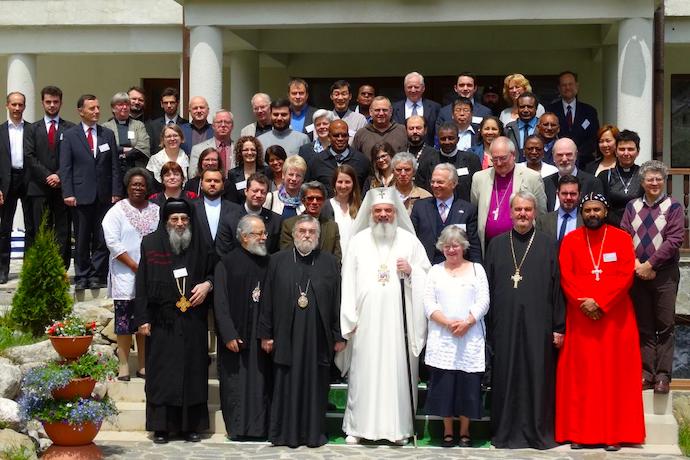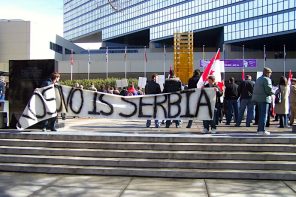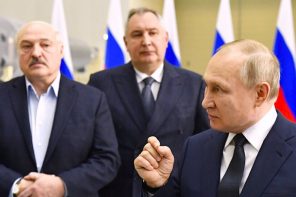Calls have grown for the Russian Orthodox Church to be expelled from the World Council of Churches (WCC) due to the support of the Moscow-based, Patriarch Kirill-led church for the Russian invasion of Ukraine. This effort has in recent days garnered some prominent supporters, including former Archbishop of Canterbury, Rowan Williams.
While it is, in light of recent events, clearly no longer sustainable for the Russian Orthodox Church to continue as part of the WCC, it’s also worth noting that the exclusion of the Russian Church undoubtedly will have some negative unintended consequences. To begin with, one must consider the current intra-Orthodox conflict in which those within the Orthodox world who wish to reconcile their faith with modern liberalism and the wider world are pitted against those who’ve adopted a much more reactionary posture, rejecting not only modern liberalism but also what this faction views as hostile outsiders, such as the West.
Furthermore, there’s Orthodoxy’s rather rocky history with the WCC, a history that emerges from this same conflict. And it’s not unreasonable to fear that such a move by the WCC will only stand to empower Patriarch Kirill and the regressive elements within the Orthodox Christian world.
Orthodox Christianity’s history with the World Council of Churches is in many ways reflective of that intra-Orthodox conflict that’s now seemingly at a fever pitch, but which has been brewing for the better part of the modern era. In this ongoing debate, ecumenism (the idea that Christians across denominational lines should work toward unity) has been a significant point of contention. The modern ecumenical movement is largely understood to have begun in the late 19th or early 20th century (depending, not surprisingly, on where your denominational sympathies lie).
Regardless, the Orthodox Christian involvement in modern ecumenism undoubtedly began in 1920, when the then-Ecumenical Patriarchate of Constantinople, Germanus V, issued an encyclical letter to “all the churches of Christ” in which he encouraged the creation of an organized body of Christian churches in order to promote trust and cooperation among Christianity’s fractured parts.
The Ecumenical Patriarchate would go on to be a founding member of the WCC. There’s been a permanent representative from the Ecumenical Patriarchate at the WCC since 1955, while the Russian Orthodox Church has had a permanent representative since 1962. The current acting secretary of the WCC is Rev. Prof. Dr Ioan Sauca, a Romanian Orthodox priest, whose own Church has often found itself caught in the crossfire between the two competing Orthodox camps, but has, since the invasion of Ukraine, adopted a much more stridently anti-Russian stance.
However, despite all this, Orthodox participation in the ecumenical movement generally, and in the WCC specifically, has been far from a straightforward, or purely positive affair. While ecumenical cooperation was never universally popular among the Orthodoxy, beginning in the 1990s, conservative forces within Orthodoxy began to push for more visibility against Orthodox participation in the ecumenical movement, specifically against participation in the WCC. Some of this opposition was connected to ecclesiological beliefs and an effort to assert Orthodox self-understanding as the “one True Church.” They feared that ecumenism, in other words, amounted to tacit acceptance of the legitimacy of other ways of being Christian.
For example, the controversial and extremely reactionary Greek Orthodox priest, Fr. Theodoros Zisis has written that “Ecumenism confounds everything. It does not believe that there is Orthodoxy; that there is Truth for which the Saints and Fathers struggled from the time of the Apostles.” Furthermore, many feared that participation in the WCC specifically suggested agreement with the decisions of other members of the council as they liberalized their views on gender and sexuality.
Ultimately, two Orthodox jurisdictions, the Georgian Orthodox Church and the Bulgarian Orthodox Church, left the WCC in the late 1990s. Anti-ecumenist sentiment remains an important pillar of reactionary Orthodox Christian thought with charges of “ecumenism” regularly invoked alongside accusations of “innovation” against their more progressive brothers and sisters to undermine the latter’s commitment to the Orthodox faith. There remain plenty of Orthodox Christians, both clergy and laity, for whom the WCC symbolizes everything they fear about modernity, progress, and the West.
It’s this reality that complicates calls to exclude the Russian Orthodox Church from the WCC.
For his part, Patriarch Kirill has been willing to use the WCC and the Russian Orthodox Church’s participation within it insofar as it benefits him. In his response to the WCC’s call that he condemn violence in Ukraine, Kirill invoked the Toronto Statement, one of the WCC’s foundational documents, which notes that the WCC can’t become “the instrument of one [school].” And there’s little doubt that Kirill is using both his association with the WCC and his ongoing dialogue with the Vatican as a means by which to assert his ever waning legitimacy.
But there’s no reason to suggest that there is anything more than pragmatism and expediency at work here. There’s nothing in Kirill’s words or actions that indicates any genuine commitment to ecumenical dialogue. In fact, one could argue that his behavior, even towards other Orthodox bishops, suggests that he is completely uninterested in pursuing Christian unity, particularly if that unity comes at the expense of Russian state power.
Any effort to expel the Russian Orthodox Church from the WCC is thus a dangerous one. The expulsion of the Russian Orthodox Church could easily be weaponized by Kirill and Putin to further their position that Russia and the Orthodox Church are under attack from a hostile, decadent West, colluding with sympathetic Orthodox Christians (who, they might suggest, are “fake” Orthodox Christians), who seek to destroy Russia, Orthodoxy, and the “traditional” values they promote and defend.
In short, expelling the Russian Orthodox Church from the WCC could very well be used by Kirill as evidence that he’s been right about the “metaphysical battle” that the invasion of Ukraine has represented all along.
Which leaves the WCC with no good options. On one hand, allowing the Russian Orthodox Church to remain does offer Kirill and his allies legitimacy and cover in their inexcusable actions. At the same time, exclusion simply fits the narrative being put forward, not only by Kirill and the Russian Church, but also by reactionary Orthodox Christians across jurisdictions, all too well.
This could very well push ultra-conservative non-Russian Orthodox Christians closer to Moscow even as it provides ammunition to use against other, more liberally-minded Orthodox Christians, creating in reality the false choice between ecumenical dialogue (and by extension engagement with the West and modernity writ large) and Orthodox unity that ultra-conservatives have always said existed.
Calls for Russia to be expelled from the WCC are being made blithely and definitively from many corners. Such a reaction is understandable, but let’s not pretend that it would come without consequences.





